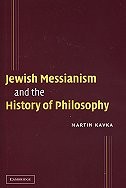|
Jewish Messianism and the History of Philosophy
|
|
Martin Kavka
|

|

Jewish Messianism and the History of Philosophy contests the ancient opposition between Athens and Jerusalem by retrieving the concept of meontology - the doctrine of nonbeing - from the Jewish philosophical and theological tradition. For Emmanuel Levinas, as well as for Franz Rosenzweig, Hermann Cohen, and Moses Maimonides, the Greek concept of nonbeing (understood as both lack and possibility) clarifies the meaning of Jewish life. These thinkers of "Jerusalem" use "Athens" for Jewish ends, justifying Jewish anticipation of a future messianic era, as well as portraying the subject's intellectual and ethical acts as central in accomplishing redemption. In addition, Kavka argues that this formal structure of messianic subjectivity is not simply an acculturating move of Judaism to modern or medieval philosophical values, but it can also be found in an earlier stratum of the Jewish tradition, particularly in an ancient midrashic text discussing a group that refers to itself as the Mourners of Zion.
This book envisions modern Jewish thought as an expression of the intimate relationship between Athens and Jerusalem. It also offers new readings of important figures in contemporary Continental philosophy, critiquing previous arguments about the role of lived religion in the thought of Jacques Deridda, the role of Plato in the thought of Emmanuel Levinas, and the centrality of ethics in the thought of Franz Rosezweig.
Martin Kavka is an assistant professor of religion at Florida State University. He is the author of articles on philosophy of religion and modern Jewish thought appearing in Religious Studies Review, Journal of Religion Ethics, Cross Currents, and other leading journals.
|
|
